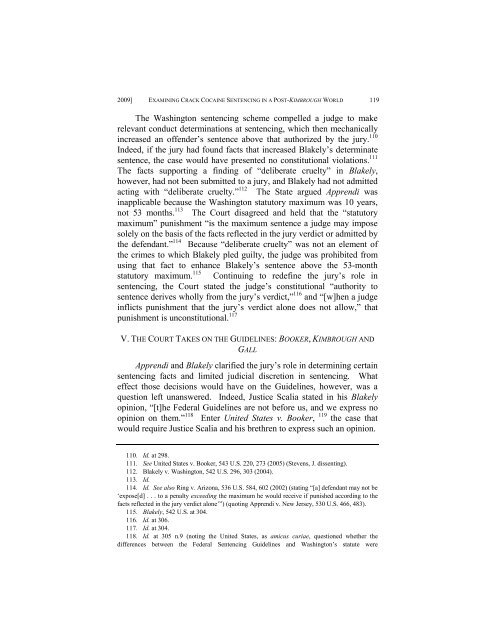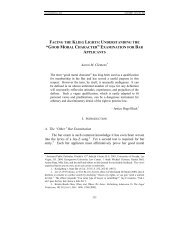Examining Crack Cocaine Sentencing in a Post- Kimbrough World
Examining Crack Cocaine Sentencing in a Post- Kimbrough World
Examining Crack Cocaine Sentencing in a Post- Kimbrough World
Create successful ePaper yourself
Turn your PDF publications into a flip-book with our unique Google optimized e-Paper software.
08-CASSIDY.DOC<br />
1/29/2009 3:29:23 PM<br />
2009] EXAMINING CRACK COCAINE SENTENCING IN A POST-KIMBROUGH WORLD 119<br />
The Wash<strong>in</strong>gton sentenc<strong>in</strong>g scheme compelled a judge to make<br />
relevant conduct determ<strong>in</strong>ations at sentenc<strong>in</strong>g, which then mechanically<br />
<strong>in</strong>creased an offender’s sentence above that authorized by the jury. 110<br />
Indeed, if the jury had found facts that <strong>in</strong>creased Blakely’s determ<strong>in</strong>ate<br />
sentence, the case would have presented no constitutional violations. 111<br />
The facts support<strong>in</strong>g a f<strong>in</strong>d<strong>in</strong>g of “deliberate cruelty” <strong>in</strong> Blakely,<br />
however, had not been submitted to a jury, and Blakely had not admitted<br />
act<strong>in</strong>g with “deliberate cruelty.” 112 The State argued Apprendi was<br />
<strong>in</strong>applicable because the Wash<strong>in</strong>gton statutory maximum was 10 years,<br />
not 53 months. 113 The Court disagreed and held that the “statutory<br />
maximum” punishment “is the maximum sentence a judge may impose<br />
solely on the basis of the facts reflected <strong>in</strong> the jury verdict or admitted by<br />
the defendant.” 114 Because “deliberate cruelty” was not an element of<br />
the crimes to which Blakely pled guilty, the judge was prohibited from<br />
us<strong>in</strong>g that fact to enhance Blakely’s sentence above the 53-month<br />
statutory maximum. 115 Cont<strong>in</strong>u<strong>in</strong>g to redef<strong>in</strong>e the jury’s role <strong>in</strong><br />
sentenc<strong>in</strong>g, the Court stated the judge’s constitutional “authority to<br />
sentence derives wholly from the jury’s verdict,” 116 and “[w]hen a judge<br />
<strong>in</strong>flicts punishment that the jury’s verdict alone does not allow,” that<br />
punishment is unconstitutional. 117<br />
V. THE COURT TAKES ON THE GUIDELINES: BOOKER, KIMBROUGH AND<br />
GALL<br />
Apprendi and Blakely clarified the jury’s role <strong>in</strong> determ<strong>in</strong><strong>in</strong>g certa<strong>in</strong><br />
sentenc<strong>in</strong>g facts and limited judicial discretion <strong>in</strong> sentenc<strong>in</strong>g. What<br />
effect those decisions would have on the Guidel<strong>in</strong>es, however, was a<br />
question left unanswered. Indeed, Justice Scalia stated <strong>in</strong> his Blakely<br />
op<strong>in</strong>ion, “[t]he Federal Guidel<strong>in</strong>es are not before us, and we express no<br />
op<strong>in</strong>ion on them.” 118 Enter United States v. Booker, 119 the case that<br />
would require Justice Scalia and his brethren to express such an op<strong>in</strong>ion.<br />
110. Id. at 298.<br />
111. See United States v. Booker, 543 U.S. 220, 273 (2005) (Stevens, J. dissent<strong>in</strong>g).<br />
112. Blakely v. Wash<strong>in</strong>gton, 542 U.S. 296, 303 (2004).<br />
113. Id.<br />
114. Id. See also R<strong>in</strong>g v. Arizona, 536 U.S. 584, 602 (2002) (stat<strong>in</strong>g “[a] defendant may not be<br />
‘expose[d] . . . to a penalty exceed<strong>in</strong>g the maximum he would receive if punished accord<strong>in</strong>g to the<br />
facts reflected <strong>in</strong> the jury verdict alone’”) (quot<strong>in</strong>g Apprendi v. New Jersey, 530 U.S. 466, 483).<br />
115. Blakely, 542 U.S. at 304.<br />
116. Id. at 306.<br />
117. Id. at 304.<br />
118. Id. at 305 n.9 (not<strong>in</strong>g the United States, as amicus curiae, questioned whether the<br />
differences between the Federal <strong>Sentenc<strong>in</strong>g</strong> Guidel<strong>in</strong>es and Wash<strong>in</strong>gton’s statute were
















